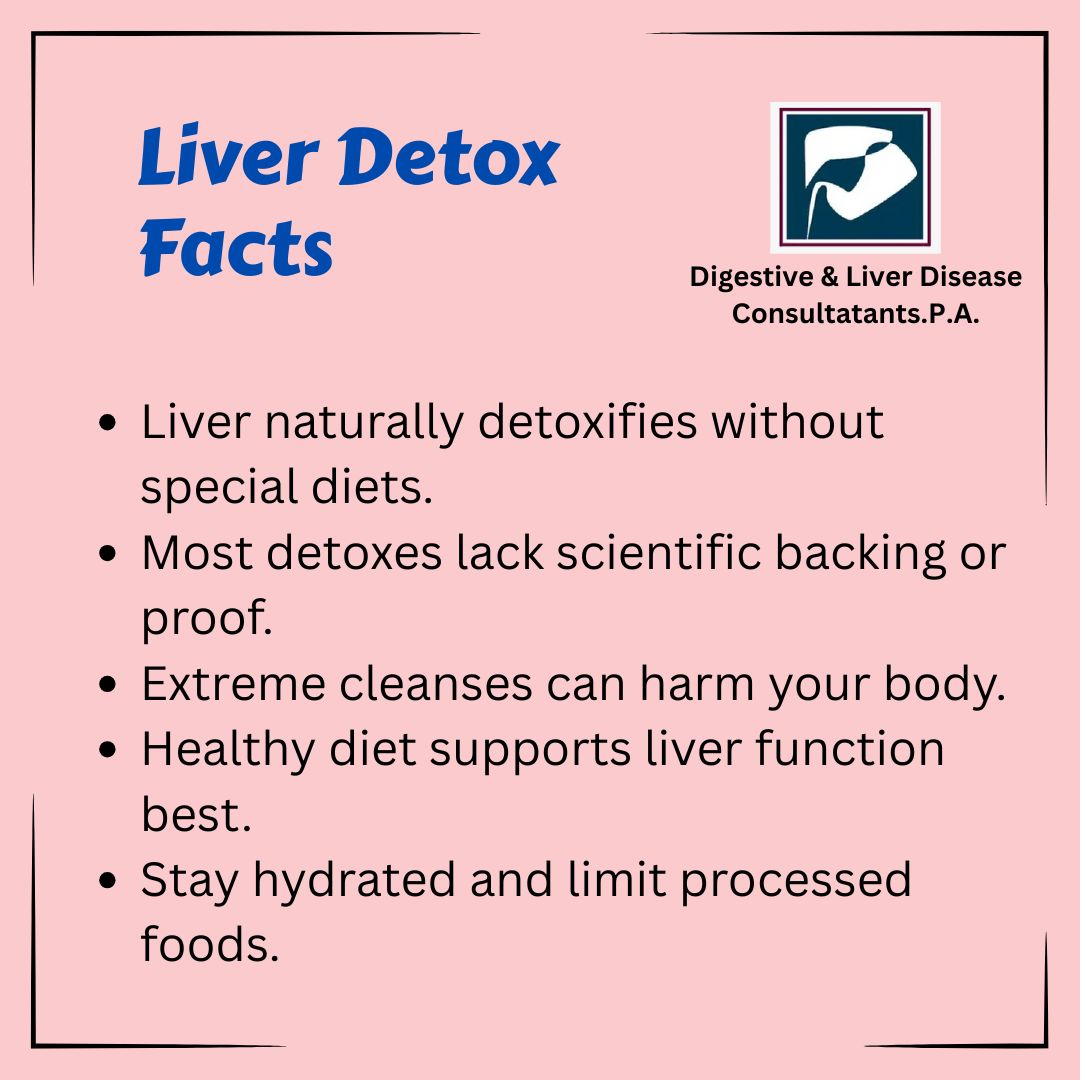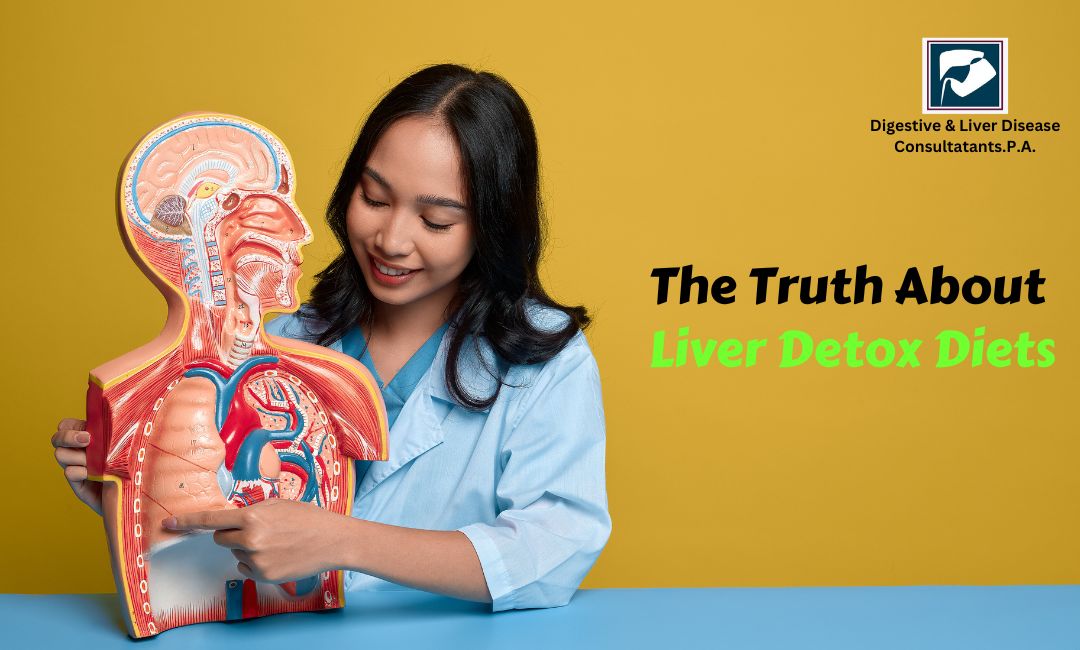The idea of “detoxing” your body — especially your liver — is very popular. Social media, advertisements, and wellness influencers often promote liver detox diets as a quick way to cleanse your system, boost energy, and lose weight. These diets usually involve drinking juices, taking herbal supplements, or fasting for several days. But how effective and safe are they really?
At Digestive & Liver Disease Consultants, P.A., we’re committed to providing you with accurate, science-based health information. In this blog, we’ll break down the facts behind liver detox diets, explain how your liver truly works, and offer healthier, evidence-based ways to support your liver’s natural detox function.
What Is a Liver Detox Diet?
A liver detox diet is usually marketed as a plan to "flush out toxins" from your liver and body. These diets often include:
- Drinking only fruit or vegetable juices
- Fasting for extended periods
- Taking herbal teas or supplements (like milk thistle or dandelion root)
- Eliminating certain food groups completely
The goal of these diets is to "cleanse" the liver and improve overall health. However, the truth is that your liver is already a highly efficient detoxifying organ — and it doesn’t need extreme diets to do its job.

What Does the Liver Actually Do?
Your liver is one of the hardest-working organs in your body. It has many essential jobs, including:
- Filtering toxins from the blood
- Breaking down medications and alcohol
- Producing bile to aid digestion
- Storing vitamins and minerals
- Regulating blood sugar and cholesterol levels
The liver naturally detoxifies your body every day — without the need for special diets or supplements. As long as your liver is healthy, it can handle most of the toxins that enter your body through food, drinks, or the environment.
Do Liver Detox Diets Really Work?
There’s no solid scientific evidence that detox diets actually improve liver function or help it eliminate toxins more effectively. In fact, some detox diets may do more harm than good. Here’s why:
Lack of Nutrients: Many detox diets are extremely restrictive. They may lack essential nutrients like protein, fiber, and healthy fats — which your liver needs to function properly.
Muscle Loss and Fatigue: Juice cleanses and fasting can lead to muscle loss and low energy levels because your body isn’t getting enough calories or protein.
Potential Liver Damage: Some herbal supplements used in detox plans can actually harm the liver. For example, products containing kava, comfrey, or chaparral have been linked to liver toxicity.
False Sense of Health: Detox diets may provide temporary weight loss, but it’s mostly water and muscle — not fat. This can give a false impression of improved health while masking underlying issues.
Common Myths About Liver Detoxing
Let’s clear up some common myths:
Myth: You need to detox your liver regularly.
Truth: Your liver detoxes itself naturally every day. Unless it is damaged or diseased, it does not need any help.
Myth: Detox diets remove stored toxins.
Truth: The body has a built-in system (including the liver, kidneys, lungs, and intestines) to eliminate toxins efficiently.
Myth: Herbal supplements are safe because they’re natural.
Truth: Natural doesn’t always mean safe. Some herbs can interfere with medications or damage the liver when used in high doses or over time.
How to Support Liver Health Naturally
You don’t need a fancy detox plan to take care of your liver. Instead, focus on long-term, healthy lifestyle habits that promote liver wellness:
1. Eat a Balanced Diet
- Include fresh fruits and vegetables, whole grains, lean protein, and healthy fats.
- Avoid processed foods high in sugar, salt, and unhealthy fats.
- Incorporate liver-friendly foods like leafy greens, garlic, beets, and turmeric.
2. Limit Alcohol
Excessive alcohol is one of the leading causes of liver damage. If you drink, do so in moderation — or not at all.
3. Stay Hydrated
Drinking enough water helps your liver and kidneys flush out waste naturally.
4. Exercise Regularly
Physical activity helps you maintain a healthy weight and reduces fat buildup in the liver, lowering your risk of non-alcoholic fatty liver disease (NAFLD).
5. Be Cautious with Medications and Supplements
Take only medications prescribed by your doctor.
Avoid overuse of over-the-counter pain relievers like acetaminophen, which can be harmful to the liver in high doses.
6. Get Vaccinated
Hepatitis A and B can cause serious liver damage. If you haven’t been vaccinated, talk to your doctor.
7. Avoid Toxins
Reduce exposure to environmental toxins like pesticides, cleaning products, and cigarette smoke.
When to See a Liver Specialist
If you have symptoms like fatigue, yellowing of the skin or eyes (jaundice), unexplained weight loss, or abdominal pain, you could have an underlying liver condition. Some common liver problems include:
- Fatty liver disease (NAFLD or alcoholic)
- Hepatitis A, B, or C
- Cirrhosis
- Liver cancer
Early diagnosis and treatment can make a big difference in outcomes.
About Digestive & Liver Disease Consultants, P.A.
At Digestive & Liver Disease Consultants, P.A., we specialize in the diagnosis, treatment, and management of a wide range of digestive and liver conditions. With years of experience and advanced diagnostic tools, our team is dedicated to providing compassionate, personalized care.
Whether you're dealing with acid reflux, irritable bowel syndrome, fatty liver, or hepatitis, we’re here to help. Our expert gastroenterologists and liver specialists offer evidence-based treatments that prioritize your health and long-term well-being.
We believe in empowering our patients with education and guidance, helping you make the best choices for your digestive and liver health.
Conclusion
Liver detox diets may sound appealing, but they’re often based on myths, not science. Your liver is a smart and self-sufficient organ that doesn’t need juice cleanses or herbal pills to function. Instead of extreme detoxes, focus on healthy, everyday habits like eating well, staying active, limiting alcohol, and avoiding unnecessary supplements.
Thinking of a liver detox? Get evidence-based advice from our expert hepatologists before you start. Book your consult today.






